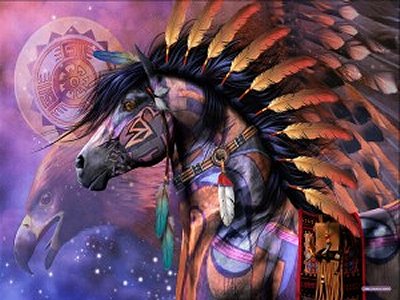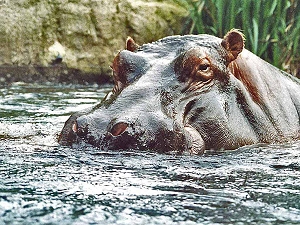 |
SPIRIT
LODGE
LIBRARY
Totem
Animals
Page
78
|
(Main
Links of the site are right at the bottom of the page)
Some of the links for the 197 pages in this Totem Animals section
are below. For the rest please go HERE
HIPPOPOTAMUS
By SisterCyber

Yesterday I was watching a show on Hippos on Animal Planet,
and after this quote from
sayahda.com, I'll tell you what I learned from the show. I wonder
if someone with spiritual
insight could add their thoughts on the additional information
in light of how it might pertain to
us as the Medicine of Hippopotamus.
“The Hippopotamus is an amazing animal that lives both
underwater and above ground. It
combines the elements of earth and water and teaches us how
to integrate the attributes of both
into our daily life. Water is associated with intuitive knowing
and earth is associated with
practicality and stability. The hippopotamus asks those with
this totem to act upon their intuition
without analyzing it while maintaining a practical grounded
lifestyle.
Hippopotamus are amphibious and have special adaptations for
life in the water. It can safely
stay underwater, able to breath, hear, and see the world above
without having to expose its body.
When this medicine is fully developed those with this totem
have an innate ability to know what
lies beneath the surface of any situation. They speak and see
truth and demand that others respect
that truth
Hippo's need water deep enough to cover them because there skin
is delicate and thin and
vulnerable to overheating. Those with this medicine are susceptible
to sunstroke and sun related
problems including dehydration so care should be taken when
outdoors.
Although the Hippopotamus is extremely agile and flexible in
its movements it has a tendency to
develop set patterns. When they leave the water at dusk, they
prefer to follow the same path
creating a rut in the ground several feet deep. The hippopotamus
teaches us to find a path that
works for us and to stay on it to reach our true destination.
Info I learned from Animal Planet show:
There is usually one dominant male in the herd, and they referred
to this Hippo as the
"patriarch." The dominant male is extremely territorial
and will defend his territory, no matter
how tired he is. They open their mouths as an act of intimidation;
making themselves look as
"big" as they can in an attempt to establish dominance
with the challenging Hippo. Even if the
challenger backs down, the dominant male will not stop there;
he will chase the cowering
challenger far away from the herd.
The one dominant male is the only one who mates with the female
hippos, thus most of the herd
are his babies. The act is done in broad view of the others.
The female pregnancy lasts 8 months,
and they only give birth to one Hippo at a time. Rarely do they
give birth to two, and if that
happens, the mother will only care for one, abandoning the other,
which dies. When the female is
ready to give birth, she usually goes away from the herd to
a different area. They give birth in the
water, and the babies can swim immediately. Their ears and nose
snaps shut automatically from
birth when they are under water.
When the baby is older (about 3 months) the mother will more
often than not, bring the baby
back to the original herd, but may join another. When rejoined
with the herd, the baby usually
seeks out the father, who they recognize as the dominant male.
They like to hang out with the
dominant male, and spend time licking and smelling them; that
is how they grow to recognize
each other. Not just do the babies hang around the dominant
male, but so do the adolescents and
some of the adults; they admire him and often follow him where
he goes. It takes 7 years for
them to mature to adults.
Africa knows Hippo as "King of the River" and they
claim most deaths are caused by Hippos,
because of their territorial nature; not because they naturally
attack humans as prey.
The dominant male usually "reigns" for about 8 years
or until he is defeated. If he is defeated, he
must leave the herd and usually dies the next day (from the
injuries sustained in the fight).
Hippos are herbivories but on the show they showed an Alligator
attack a zebra; the Alligator
was feeding on the Zebra and the dominant Hippo came and shooed
the alligator off to snack on
the meat of the zebra! The commentator mentioned that although
they do sometimes eat meat, it
is more of a "delicacy" for them and they do not seek
it as in killing for it; they only kill when
they feel that their territory is threatened. Anyway, they very
rarely eat meat; mostly survive off
the vegetation on the bottom of the river and along the shorelines.
Hippos spend up to 18 hours a day under water. They can hold
their breath up to 5-6 minutes.
They even sleep underwater occasionally. When their bodies are
submerged for extend periods
of time, their nostrils will be the only part of their bodies
above water. They don't really swim
underwater; hippos walk on the bottom of the river. It seemed
more like they bounce on their
tippy-toes and move in a trampoline-like way, and they can do
this from birth. That's where they
feed mostly; from the vegetation at bottom of the river.
They have 3 layers of skin that are very thick; the top layer
is not as thick; it is the thinnest layer
of skin they have, and this is why they are susceptible to sun
burn and need to keep themselves
moist. Though Hippos are big they are made up of bone, muscle
and of course, their 3 layers of
skin; they have very hardly any fat.
|
Libraries
are on this row
|
|
|
INDEX
Page 3
(Main Section, Medicine Wheel, Native Languages &
Nations, Symbology)
|
|
INDEX
Page 5
(Sacred Feminine & Masculine, Stones & Minerals)
|
|
|
|
|
|
©
Copyright: Cinnamon Moon & River WildFire Moon (Founders.)
2000-date
All rights reserved.
Site
constructed by Dragonfly
Dezignz 1998-date
|
|